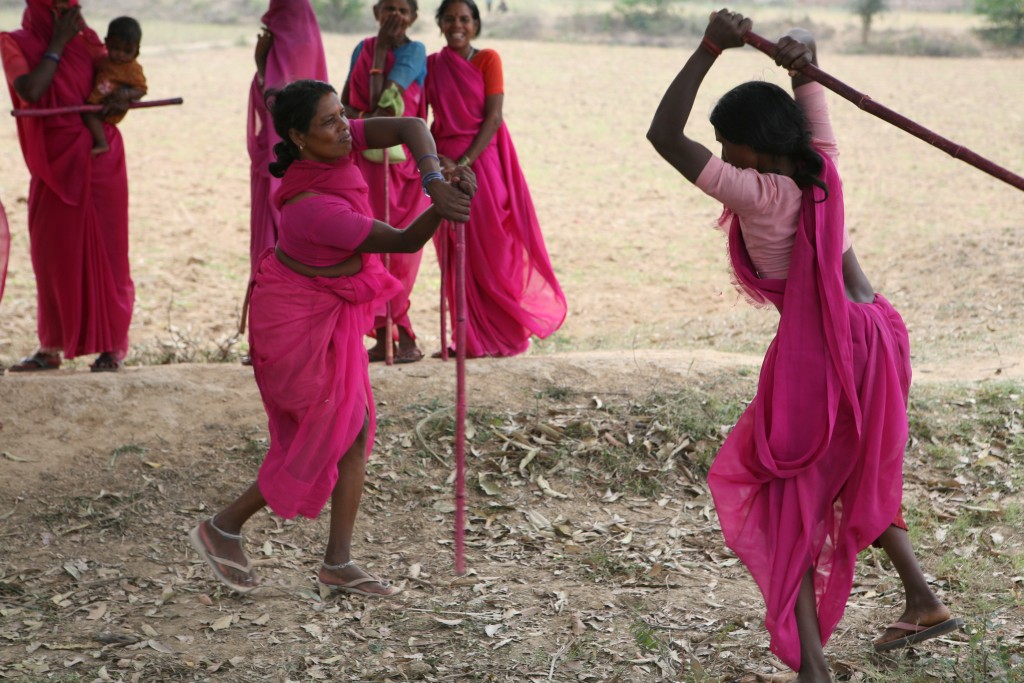Enter the badlands of Bundelkhand in central India and you have entered a place of desolation, dust and despair. And yet it is hope that we discover as we follow the pink sari-clad women of Gulabi Gang. These women travel long distances by cart and tractor, bus and train, to wrest justice for women and Dalits, undeterred by sneering policemen and condescending bureaucrats. Sampat Pal, their leader is a rough-and-tough woman with a commanding personality. Despite her lack of education she has evolved her own brand of feminism and egalitarian politics. Her strength lies in her words. She is constantly on the move – today investigating a young woman’s suspicious death, tomorrow protesting against a corrupt official. The gang encounters resistance everywhere – whole villages connive in protecting the perpetrators of violence. As the film pulls us into the centre of these blazing conflicts, it uncovers a story that is disturbing yet heartening.
“Documentary film hai, bhaiya. Pakka ticket doon?” (“It’s a documentary film, brother. You sure you want a ticket?”) says the guy at the ticket window, inadvertently summarising the state of documentary film market in India. In the recent past many notable Indian documentaries have made waves in the festival circuits however generally most of them don’t see a release and even if they do they don’t garner a lot of revenue (except maybe a Supermen of Malegaon once in a while). So it is refreshing to see another acclaimed documentary finding its way to the theatres after quite a while.
Gulabi Gang begins with a beautiful montage of the now much publicised, colourful pink saris and we are immediately transported to Bundelkhand, the basic operating ground of the organization formally known as Gulabi Gang. The film doesn’t waste much time and we are into the action right away as the camera follows Sampat Pal, the founder leader of the gang and her dealing with the issues of female exploitation in a terrain where the fairer gender appears severely endangered. Through her travails and visits to various villages we come face-to-face with a reality of extreme patriarchal society where belonging to the fairer sex is almost a curse and this reality can be found just a few hundred kilometers from the nearest metro towns. The women get married off at ages 10-11 and then are subject to harassment and even murdered without second thought. This is the order of the day and the society supports this treatment of women with nonchalance.
We see all this and more through Sampat Pal’s eyes. We feel her rage, her helplessness and her resolve in her uphill fight against the kind of system she has grown up in. The years of struggle are visible in the creases on her face and the film gets its more visceral moments when the camera is focused away from the victims and on to the own story of the Gulabi Gang members that we meet in the journey. Their internal battles come to fore time and again as the director Nishtha Jain doesn’t shy away in highlighting their own struggle to keep working on the cause together.
The film follows several intriguing cases and incidences and the struggle of Pal and her ‘commanders’, as they are termed in the gang, against the local police, panchayat and at times their own members of the gang. The movie neither deifies or vilifies, as is the fallacy of many documentaries, its protagonist but instead lets the viewer into the world of these brave women. The gang itself is plagued with internal issues which are brought out in a conflict and the discussion that happens on camera lets out more than perhaps anticipated. The movie is interspersed with images that are shocking and extremely moving at the same time. The emotional outburst of one of the commanders in which she reveals her motivation for joining the gang is a powerful sequence.
The only qualm perhaps here is that the movie does not necessarily pursue the leads and incidents it presents us with – neither with a summary of what happened to those women before or afterwards and though it might be deliberate, it does leave the viewer wanting to know more. The movie in this sense basically provides a snapshot of the gang and the women from extremely close quarters and succeeds in what it set out to achieve.
Kudos to director Nishtha Jain and her team for doing a wonderful job in this neutral and sensitive portrayal of the Gulabi Gang and its struggle. This is necessary and powerful cinema that should be mandatory viewing. Go and watch it before this real struggle leaves the screens and the filmi one reaches it on March 7.
Hindi, Bundelkhandi, Color


